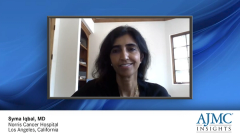
Evaluating Gastroesophageal Cancer Pathway Decisions
Laura Bobolts, PharmD, BCOP, discusses GI and esophageal cancer treatment pathway decisions.
Episodes in this series

Laura Bobolts, PharmD, BCOP: Considerations for formularies or pathway placement for immunotherapy drugs in the treatment of upper–GI [gastrointestinal] and esophageal cancers are complex. There isn’t 1 recipe that fits all. It’s difficult to assess the value of a cancer therapy because we don’t have head-to-head clinical trials. We have a lack of real-world evidence. We don’t have good cost-effective analyses. Many come out after the FDA approval. We have a lack of quality-of-life analyses. All of this combined makes it complex to assess the value.
When I’m looking to assess the value of a therapy for formulary or pathway placement, I’m thinking about efficacy first. How efficacious is that therapy? I’ll tell you. I’m looking to see if it improves survival. If a therapy improves survival, even if it isn’t cost-effective, that answers my biggest question on pathway placement. I’m absolutely looking at survival. I’m looking at the design of the clinical trial. Was it [compared with] an active comparator? Was it a phase 3 trial? Was it a weaker trial? Is the trial looking at a strong end point, such as overall survival? Or is it looking only at objective response rate? I’m looking at the totality of the efficacy data for that therapy, then I’m matching it [with] therapies in a similar space. What other regimens may oncologists select for a similar patient with cancer? If I have everything on par—which doesn’t always happen—and I have similar efficacy, then I’m looking at additional factors to assess value. I’m thinking about the toxicity profiles of regimens in a similar space for that patient with cancer. If toxicity is similar, I’m looking at cost.
Cost is very complex. Cost isn’t first from a payer’s perspective, like people may think. Because if therapy can improve survival and control the cancer for a longer duration, payers know that should ultimately reduce costs down the line. You should have fewer scans for imaging, fewer ED [emergency department] visits, fewer hospitalizations, and less toxicity management if that patient with cancer is on the right therapy up front, even if that therapy has a higher cost. When we’re splitting hairs and looking at the cost of therapies, it’s very important to look at the total cost of care. Resource utilization is included. Does this therapy need G-CSF [granulocyte colony-stimulating factor]? Does this therapy need more antiemetics than another therapy? Are patients on this therapy more likely to use hospital services and ED services because of toxicity?
It’s important to look at the total cost of care and then evaluate the data over time and measure the total cost of care of these regimens in the real world going forward to assess the value of a therapy. Beyond that, I’m also looking at quality-of-life data and cost-effective analyses. Should they be available? All in all, there isn’t 1 answer. There are value assessments in oncology—ASCO [American Society of Clinical Oncology] has them, and the NCCN [National Comprehensive Cancer Network] has evidence blocks. But you need far more than a value-based tool to assess the value of a cancer therapy. You have to look at multiple factors.
Transcript edited for clarity.
Newsletter
Stay ahead of policy, cost, and value—subscribe to AJMC for expert insights at the intersection of clinical care and health economics.











